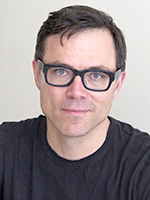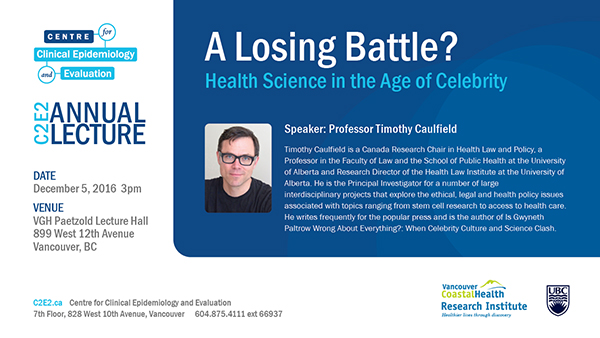
C2E2 Annual Lecture focuses on popular culture’s impact on health and what researchers can do to counter its influence.
Whether you’re the type of person who follows all the stars on Instagram, or whether you’re not quite sure what a Kardashian is, celebrity and popular culture influence how all of us think and talk about health.
“You may not think you’re affected by it, but celebrity culture matters,” says Tim Caulfield, Canada Research Chair in Health Law and Policy and research director of the Health Law Institute at the University of Alberta (U of A). “Popular culture has always been around, but really it’s over the last 10 to 15 years that it’s accelerated in terms of the influence it’s having.”
Caulfield, who is also a professor in the Faculty of Law in the School of Public Health at the U of A, is the guest speaker for this year’s Centre for Clinical Epidemiology & Evaluation (C2E2) Annual Lecture.

For evidence of celebrity culture’s influence, one need only look to Angelina Jolie’s 2013 New York Times opinion-editorial about her decision to have genetic breast cancer screening tests and a subsequent double mastectomy. Soon after, “the Angelina effect” took hold and women began requesting risky surgeries that health agencies like the Canadian Cancer Society worried were not necessary.
“Similarly, the myths around vaccination serve as a great example. The vaccination hesitancy movement has concerns about safety, even though those concerns are not founded in science at all,” says Caulfield.

Further complicating the efforts to counter celebrity culture’s grip on health information is the public’s mistrust of science.
“I hear this all the time from the public: ‘We can’t trust science anymore because it’s been bought out by big industry and pharmaceuticals for their own interests’,” says Caulfield. “We have this breakdown in trust and that’s something we really need to listen to.”
“We need to make sure that we’re producing science that is trustworthy and that the voices that are talking about science are trustworthy.”
Caulfield calls on scientists to take an active role in teaching science literacy.
“There’s a bit of research showing that teaching people about science and improving science literacy, such as teaching about causation – i.e. seeing causation when none exists – may be one of the biggest driving forces of pseudoscience,” explains Caulfield. “People misattribute connections when there aren’t any and there’s some evidence showing that teaching people about the causal illusion can help them make more rational decisions and overcome that cognitive bias.”
Perhaps the most immediate and effective way in which researchers and scientists can counter popular culture’s influence and spread science literacy directly, is to engage in the conversations often happening via social media, and start taking away ownership of social media from celebrities.
“Too often scientists shy away from being involved in social media. It seems trivial, and not a good use of time, but given the power of social media and pop culture over our health, I think we do need to get involved,” asserts Caulfield.
“Be on social media. And when we hear something that’s not true, let’s become part of the discussion and try to discount it quickly. There is a bit of evidence suggesting that you can change the conversation with a trusted voice. And if something health-related is being presented as if it’s scientific but isn’t, I think it’s fair game to say: ‘Look, this is non-sense, this is bunk, it does not have any science to support it’.”
“Researchers can create their own narratives wrapped in good science, with interesting narrative and good information,” says Caulfield. “We need to get creative and involved – celeb culture isn’t going away. Pop culture isn’t going away. Neither is social media. Get involved. Be part of the discussion.”
Caulfield’s message is one that researchers and scientists should hear, says Dr. Stirling Bryan, director of C2E2.
“For me, professor Caulfield’s work relates directly to our knowledge translation stream of activity at C2E2,” says Dr. Bryan. “We try to support evidence-based policy and clinical practice decisions. However, we haven’t given as much focus on that knowledge translation piece to the public more generally, and to the patient communities more broadly.”
“This topic speaks to that interest within C2E2 to have knowledge translation also suit a lay audience and trying to make sure that the work we do, the science we undertake, the evidence we generate, is accessible to folks who don’t have a professional background in health care.”
Register now for the C2E2 Annual Lecture on December 5th, 2016.



